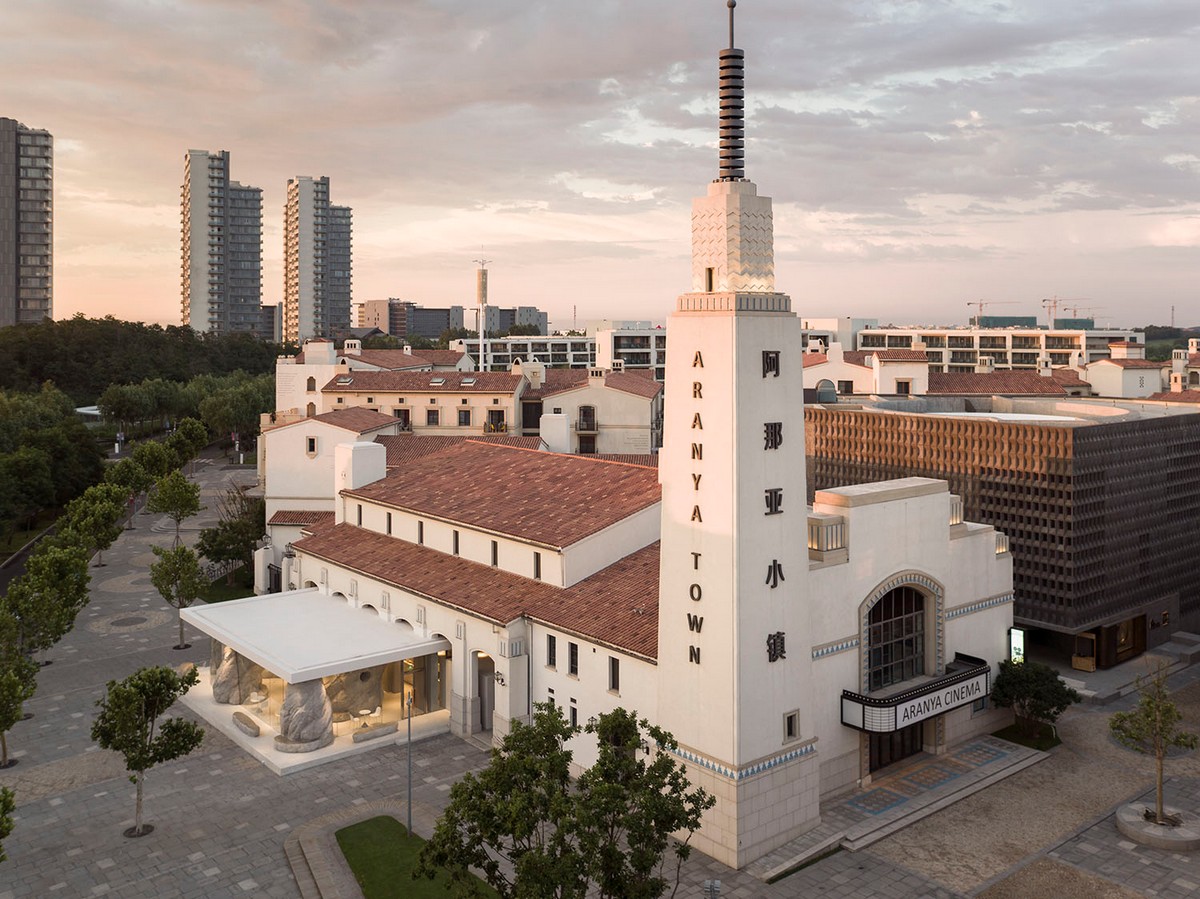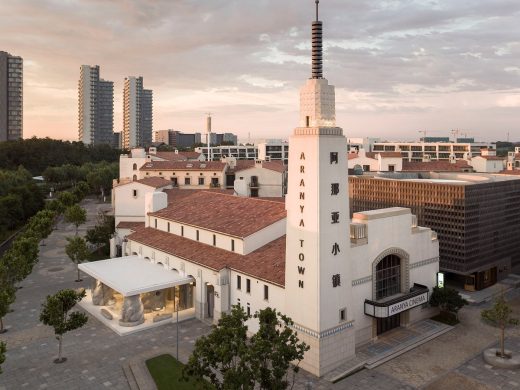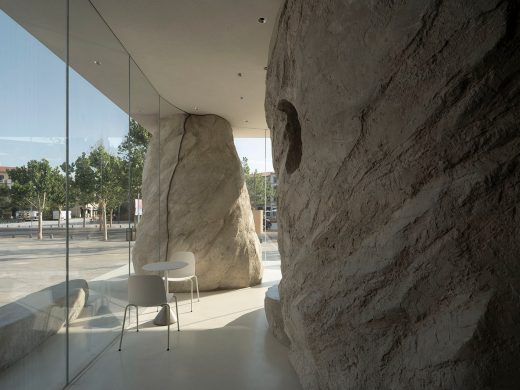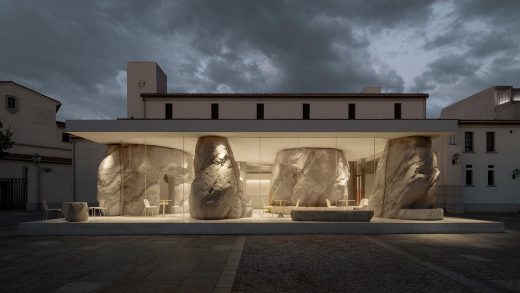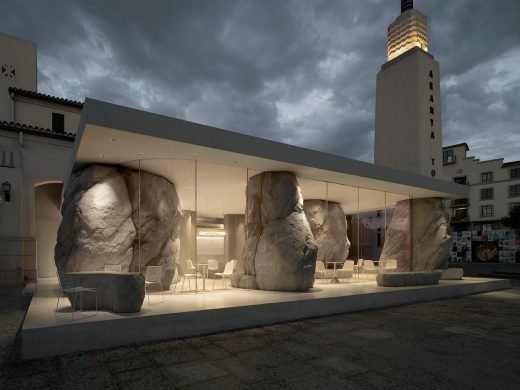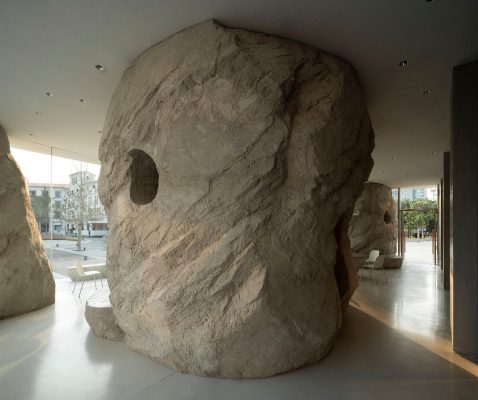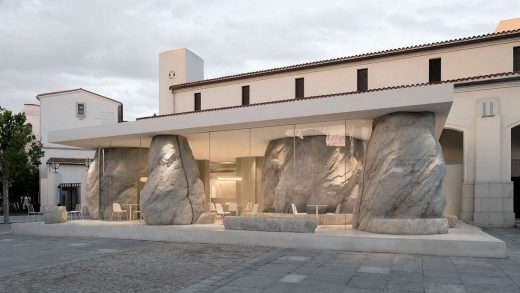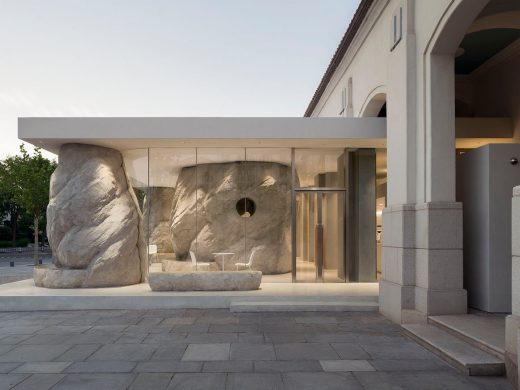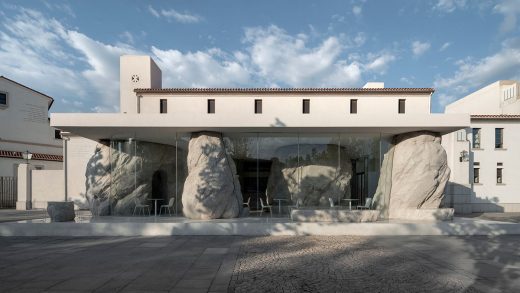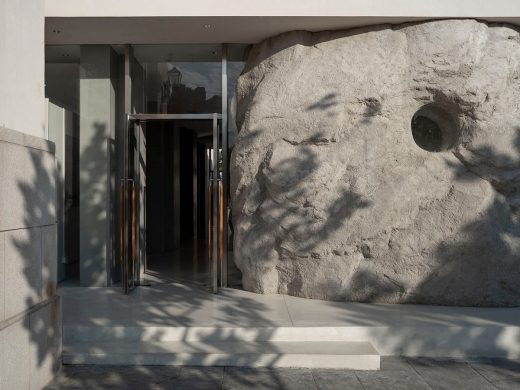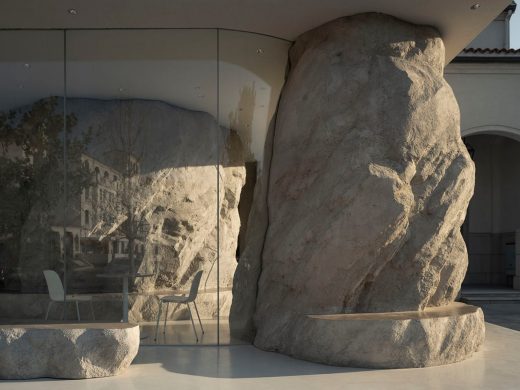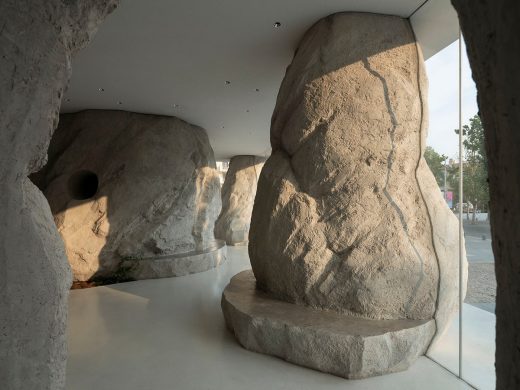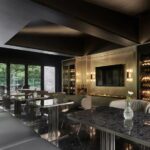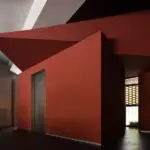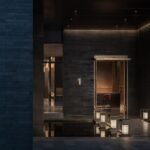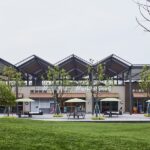Zolaism Café Aranya, Qinhuangdao Dessert Shop, Hebei Store Building Photos, Chinese Architecture Design
Zolaism Café Aranya, Qinhuangdao, Hebei, China
7 December 2021
Design: B.L.U.E. Architecture Studio
Location: Qinhuangdao, Hebei Province, Northern China
Photos by Eiichi Kano
Zolaism Café Aranya, Qinhuangdao Building Design
Project overview
The project is the new store of the new-Chinese-style dessert brand “Zolaism” in Aranya, Qinhuangdao, one of the most popular seaside resort communities sitting 3-4 hours drive from the central city of Beijing. Located in the plaza of the community, the site is an addition attached to the north side of the original building of cinema, facing the main road and featuring a wide field of view.
The philosophy of the brand derives from the natural beauty of mountains and seas. Because of the brand concept and the humanistic atmosphere of the community by the sea, the architects drew inspirations from nature while respecting the spirit of the site and continuing the brand spirit.
Design concept
The design starts from nature. In the vast world, humans are small and lonely entity. The tranquility and vastness of nature help people to escape from the rhythm of urban life and to return to their true nature. Here, the architects hope the architecture can be a spiritual place for people to settle down.
The design also starts from emotion. Living in highly-industrialized and information-based modern cities, the spaces and the products B.L.U.E. Architecture Studio use are mostly the results of data analysis and rational judgement. Under the condition, people can hardly build emotional connection with objects and spaces; they can hardly feel truly relaxed and free. The architects contend that today’s architecture needs more irrational characteristics in order to highlight the value of emotions. Space is not only a container for specific functions, but more importantly, also a carrier of emotions and memories. Thus, the sense of experience and spirituality of architecture have become the core of our design.
Architectural form
In the open small plaza, several rocks with natural form are scattered in between, supporting a large eave. With its back against the north facade of the original cinema building, the architecture of Zolaism is featured with three sides of glass curtain wall enclosures, forming a whole space that integrates the interior and the exterior.
The organic form of the stones, on one hand, seems random and improvisational; on the other hand, the stones with different sizes play the role of hidden steel column structure, and also help divide functional areas. Inside the two largest rocks are private resting rooms, and the shapes have combined the function of fixed seating at the bottom. The scattered seatings spread freely throughout the spaces between the mountain rocks. The plan gives the whole space a sense of fluidity and openness, providing guests a constantly changing spatial experience while walking.
The stone shapes were created by GRC pouring: the natural texture of concrete has revealed coarse and heavy texture of the rocks, while forming a strong visual contrast with the lightness and transparency of the surrounding ultra-clear glass in order to emphasize a sense of power of the form. The frameless full-height glass curtain walls introduce plenty of sunlight into the indoor space, and the dynamic play of light and shadows changes over time, providing guests a feeling of resting in nature.
Construction process
Compared to conventional architectural projects, the design and construction process of Zolaism has made some breakthroughs. From the beginning of the design process, we explored the spatial form through handmade models. We started from physical foam models with a scale of 1:100, and made sets of different models to study the composition of architectural space.
During our exploration, the foam corroded by glue presented natural and uneven texture, and the vivid form occasionally helped our design process. With the deepening of the design project, B.L.U.E. Architecture Studio gradually enlarged the scale of models, and eventually finalized the spatial form and organization with a 1:30 model, and then the production of model making was started at a professional factory. At first, a 1:10 handmade clay model was created. Clay, as natural material, provides us a more intuitive understanding and grasp of the form and aesthetics of the space.
Subsequently, the scale of the model continued to be enlarged during constant adjustments until the 1:1 clay sculpture model was finalized. The entire production process relied on neither the help of computer 3D modeling nor construction documents. Instead, it was all done by hand of the designers and the contractor. Then after the turnover formwork and GRC module pouring process, the finished and individual modules were transported to the site for assembly. Finally, the architecture was successfully completed.
The whole construction process is full of unknown and uncertainty. To a certain extent, B.L.U.E. Architecture Studio gave up the overall control of architectural form. Instead, the architects let our hands to think and allow the design to grow with the flow. With the guidance of perceptual experience and adhoc judgement, B.L.U.E. Architecture Studio gradually refined the design to a more mature scheme.
The architecture with such design and construction process cannot be replicated or replaced, which endows the space with unique values of emotions and strength. In a seaside resort community like Aranya away from the noise of the cities, people need places to rest their bodies and spirits. The sensual and perceptual space the architecture studio created with our intuition not just provides an environment close to nature, but also inspires a state of mind of returning to nature. It encourages people to put away the burden of urban life to get relaxation and freedom of minds.
Look forward
Since the beginning of the 20th century, the essence of modernism architecture is the supremacy of functionalism. Rational judgement and logical thinking are the core of modernism design. Nowadays, the process of space virtualization is constantly undermining functionalism. Meanwhile, the development of big data and artificial intelligence has gradually weakened the values of designers’ rational thinking.
B.L.U.E. Architecture Studio believe that in the future, the value of spatial design is more about perception, experience and ideal, and it should embrace a certain amount of contingency. The design for Zolaism reveals both the relativity and integration of human and nature. The architectural space has become a spiritual habitat. As a new beginning, this experimental attempt stands as our exploration of the relationship between nature and artificial environment in the new era.
Zolaism Café, Aranya, Qinhuangdao, Hebei, China – Building Information
Project Name: Zolaism Café, Aranya
Location: Qinhuangdao City, Hebei Province, China
Project Type: Café, Architecture / Interior Design
Architect: Shuhei Aoyama, Yoko Fujii, Lingzi Liu, Jiaxi Li, Ziwei Zhou – B.L.U.E. Architecture Studio
Lighting Design: B.L.U.E. Architecture Studio
Client: Zolaism
Size: Single Floor
Site Area: 240㎡
Gross Area: 170㎡ (interior) / 47㎡ (exterior)
Design Period: 08. 2020 – 12. 2020
Construction Period: 01. 2021 – 05. 2021
Materials:
Wall: cement coating
Floor: terrazzo
Rock Sculpture: GRC
Photography: Eiichi Kano
Zolaism Café Aranya, Qinhuangdao Building, China images / information received 071221 from B.L.U.E. Architecture Studio
Location: Qinhuangdao, Hebei province, People’s Republic of China
Hebei province Buildings
Another Qinhuangdao building on e-architect:
Aranya theTANG hotel, Qinhuangdao
Design: B.L.U.E. Architecture Studio
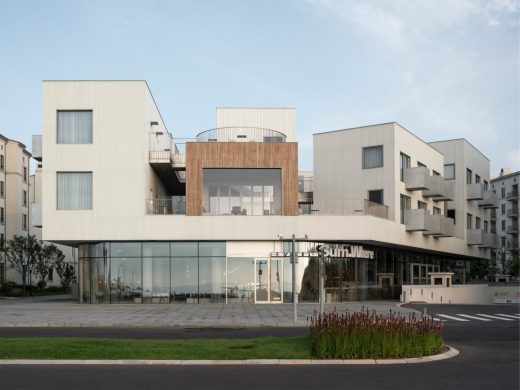
photos by Eiichi Kano / theTANG hotel
Aranya theTANG hotel, Qinhuangdao
Contemporary Architecture in Hebei province – architectural selection below:
Aranya Cloud Center
Design: MAD Architects
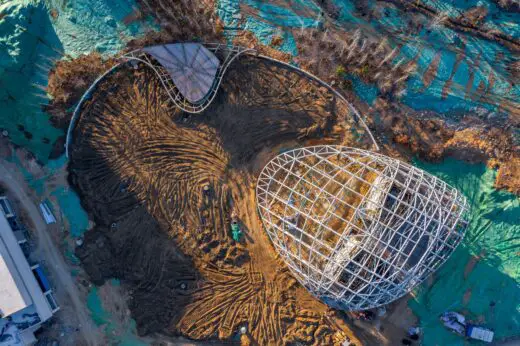
photograph : CreatAR
Aranya Cloud Center Qinhuangdao
1402 Coffee Shop in Aranya
Architects: B.L.U.E. Architecture Studio
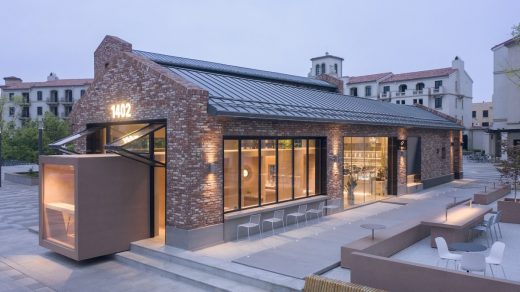
photo : Zhi Xia
1402 Coffee Shop in Aranya
Striped House, Qinhuangdao
Design: Wutopia Lab
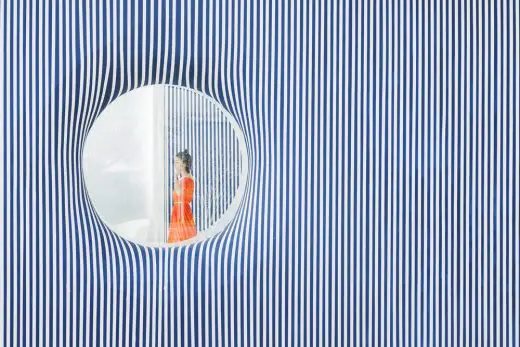
photo © CreatAR Images
Striped House – Aranya Visitor Center
Hebei Grand Hotel, Anyue, Shijiazhuang
Architects: LWK + PARTNERS
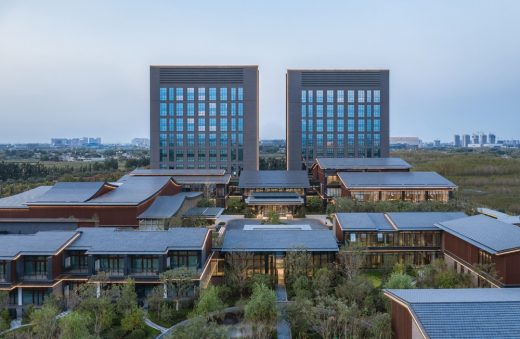
photograph : LWK + PARTNERS
Hebei Grand Hotel, Anyue in Shijiazhuang
Dingshi Logistics Office Building Hebei
Da Chang Muslim Cultural Center, Hebei
Architecture in China
China Architecture Designs – chronological list
Chinese Architect – Design Practice Listings
Wan Wea Restaurant, Shimao Plaza, Chengdu
Interior design: IN.X Design
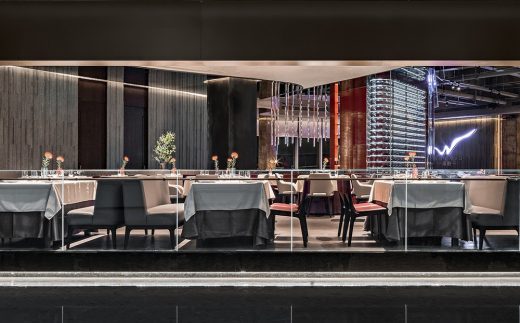
photo : Yan Zheng
Wan Wea Restaurant, Shimao Plaza Chengdu
Han Shang Lou Restaurant, Phoenix island, Xiangqiao District, Chaozhou, Guangdong Province
Architects: Jingu Phoenix Space Planning Organization
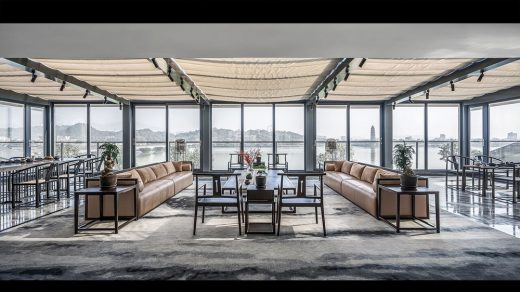
photograph : MConcept
New Restaurant in Guangdong
Xiamen HAIGAN Xiaoyouyu Seafood Restaurant, Huli District, Xiamen City, Fujian Province
Architects: Xiamen Fancy Design & Decoration
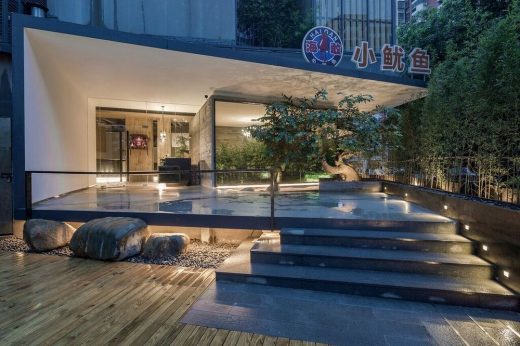
photograph : Jin Weiqi
Seafood Restaurant in Xiamen City
Comments / photos for the Zolaism Café Aranya, Qinhuangdao Building in Hebei design by B.L.U.E. Architecture Studio page welcome

